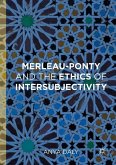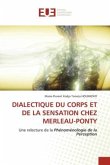Maurice Merleau-Ponty (1908-61) was one of the most important philosophers of the twentieth century. His theories of perception and the role of the body have had an enormous impact on the humanities and social sciences, yet the full scope of his contribution not only to phenomenology but philosophy generally is only now being fully recognized. In this lucid and comprehensive introduction, Taylor Carman explains and assesses the full range of Merleau-Ponty's philosophy.
Beginning with an overview of Merleau-Ponty's life and work, subsequent chapters cover fundamental aspects of Merleau-Ponty's thought, including his philosophy of perception and intentionality; the role of the body in perception; freedom and our relation to others; history and culture; and art, particularly the paintings of Cézanne. A final chapter considers Merleau-Ponty's importance today, examining his philosophy in light of recent developments in philosophy of mind and cognitive science.
This second edition makes use of the new translation of Merleau-Ponty's Phenomenology of Perception, his most important work, highlighting its critique of "objective thought" and the account of constrained freedom that Merleau-Ponty advanced as a foil to Sartre's notion of radical choice.
Including annotated further reading and a glossary of key terms, Merleau-Ponty, Second Edition is essential reading for students of phenomenology, existentialism and twentieth-century philosophy. It is also ideal for anyone in the humanities and social sciences seeking an introduction to Merleau-Ponty's work.
Beginning with an overview of Merleau-Ponty's life and work, subsequent chapters cover fundamental aspects of Merleau-Ponty's thought, including his philosophy of perception and intentionality; the role of the body in perception; freedom and our relation to others; history and culture; and art, particularly the paintings of Cézanne. A final chapter considers Merleau-Ponty's importance today, examining his philosophy in light of recent developments in philosophy of mind and cognitive science.
This second edition makes use of the new translation of Merleau-Ponty's Phenomenology of Perception, his most important work, highlighting its critique of "objective thought" and the account of constrained freedom that Merleau-Ponty advanced as a foil to Sartre's notion of radical choice.
Including annotated further reading and a glossary of key terms, Merleau-Ponty, Second Edition is essential reading for students of phenomenology, existentialism and twentieth-century philosophy. It is also ideal for anyone in the humanities and social sciences seeking an introduction to Merleau-Ponty's work.
Praise for the First Edition:
'Carman gives a fresh, clear, and convincing account of Merleau-Ponty's thought. His book is the best available thus far and should be required reading for those interested in Merleau-Ponty's original and important ideas and how they relate both to our pervasive perceptual experience and to current philosophical debate.' - Hubert Dreyfus, University of California, Berkeley, USA
'This is the best introduction to Merleau-Ponty's work available. It provides a clear and lucid overview of the whole of Merleau-Ponty's thought, presenting the central ideas and themes of his writings in an accessible yet rigorous way. As such, it will be of interest to beginners and advanced scholars alike.' - Mark Wrathall, University of Oxford , UK
'... a wonderful exposition of Merleau-Ponty's philosophy as a whole. It offers clear explanations of Merleau-Ponty's ideas and some of the most significant theories and movements that influenced him, and shows how his thinking developed across the course of his life. In addition, Carman has written with great panache.' - Komarine Romdenh-Romluc, University of Sheffield, UK
'Carman's accounting is nuanced, closely argued, and exceptionally clear. His introduction covers the whole of Merleau-Ponty's considerable corpus, tracing its development and exhibiting its continued relevance for contemporary debates in phenomenology and psychology, philosophy of mind, and metaphysics. It will be enormously useful to teachers and students seeking an accessible introduction to Merleau-Ponty's writings.' - Wayne Martin, University of Essex, UK
'This book is extremely well written - very clear and engaging - and, with regard to its representation of Merleau-Ponty's philosophy, the account is comprehensive and insightful. I would recommend this book as the first and main commentary for students to consult.' - Sebastian Gardner, University College London, UK
'Carman gives a fresh, clear, and convincing account of Merleau-Ponty's thought. His book is the best available thus far and should be required reading for those interested in Merleau-Ponty's original and important ideas and how they relate both to our pervasive perceptual experience and to current philosophical debate.' - Hubert Dreyfus, University of California, Berkeley, USA
'This is the best introduction to Merleau-Ponty's work available. It provides a clear and lucid overview of the whole of Merleau-Ponty's thought, presenting the central ideas and themes of his writings in an accessible yet rigorous way. As such, it will be of interest to beginners and advanced scholars alike.' - Mark Wrathall, University of Oxford , UK
'... a wonderful exposition of Merleau-Ponty's philosophy as a whole. It offers clear explanations of Merleau-Ponty's ideas and some of the most significant theories and movements that influenced him, and shows how his thinking developed across the course of his life. In addition, Carman has written with great panache.' - Komarine Romdenh-Romluc, University of Sheffield, UK
'Carman's accounting is nuanced, closely argued, and exceptionally clear. His introduction covers the whole of Merleau-Ponty's considerable corpus, tracing its development and exhibiting its continued relevance for contemporary debates in phenomenology and psychology, philosophy of mind, and metaphysics. It will be enormously useful to teachers and students seeking an accessible introduction to Merleau-Ponty's writings.' - Wayne Martin, University of Essex, UK
'This book is extremely well written - very clear and engaging - and, with regard to its representation of Merleau-Ponty's philosophy, the account is comprehensive and insightful. I would recommend this book as the first and main commentary for students to consult.' - Sebastian Gardner, University College London, UK








